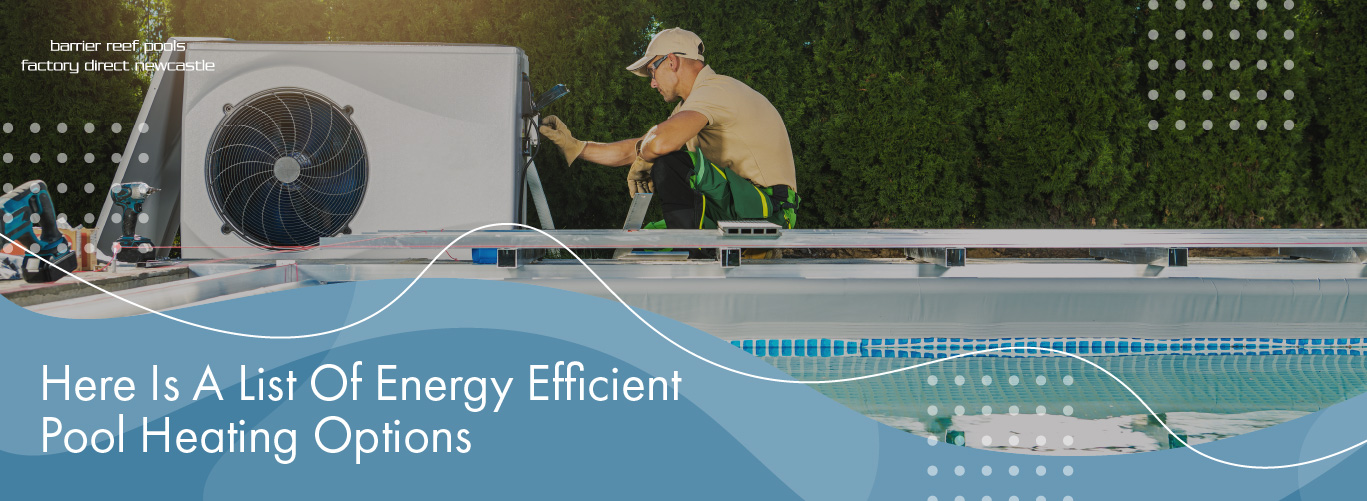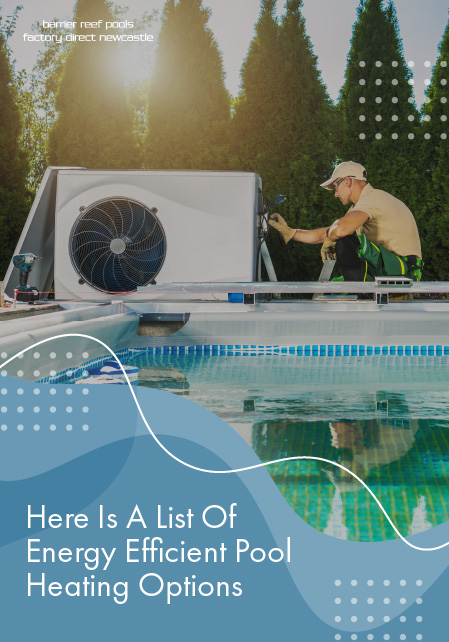Here Is A List Of Energy Efficient Pool Heating Options
When it comes to extending your pool season or taking the chill out of the water for that perfect, comfortable swim, the right pool heater can make all the difference. However, in an age where environmental responsibility is becoming central to our decision-making, pool owners are increasingly looking for ways to keep their water warm without the environmental and financial strains often associated with traditional pool heaters. In this comprehensive guide, we'll explore several energy-efficient pool heating technologies, complete with a breakdown of how they work, the benefits they offer, as well as considerations for cost, installation, and the environmental impact. Whether you're a swimming pool owner with an eye on your electricity bill or a home improvement enthusiast eager to make a greener choice, this article is your go-to resource.

Solar Pool Heaters
Solar pool heaters are the quintessential green pool heating solution. They utilise energy from the sun to raise the temperature of your pool water, eschewing the need for more conventional, energy-intensive methods. A typical system includes solar collectors – which can be mounted on a roof or a nearby yard – a filter, a pump, and a flow control device.
How Solar Pool Heaters Work
These heaters operate by circulating pool water through the pump, which then filters it before it flows through the solar collectors. As the water is exposed to the sun, it is heated and returned to the pool. The process is automated to ensure water is heated consistently during daylight hours.
The Pros and The Cons
Benefits:
- Significant cost savings on energy bills
- Low operating costs once installed
- They’re virtually maintenance-free
Drawbacks:
- Reliance on sunny weather can impact consistency of heating
- Upfront costs for installation and panels can deter some
Cost Considerations
The initial investment in a solar pool heating system can be high, but the long-term savings on energy are substantial. Homeowners can often recoup their investment within a few years, thanks to reduced monthly energy bills.

Heat Pumps: Efficient and Versatile
Heat pumps are another environmentally friendly option that operates by capturing and transferring heat rather than producing it. It’s an eco-conscious choice that can also work in cooler and overcast conditions.
Understanding Heat Pump Technology
A heat pump consists of a fan, a compressor, a refrigerant coil, and a heat exchanger. The fan draws in air, which passes over the evaporator coil. The refrigerant within the coil absorbs the heat from the air and turns it into a warm gas. This gas then passes through the compressor, which raises the temperature even further, before its heat is transferred to the pool water in the heat exchanger.
Efficiency and Performance
Heat pumps are incredibly efficient, offering as much as 5 units of heat for every 1 unit of electricity used. They can maintain a steady temperature range in milder climates and are a cost-effective option when it comes to keeping your pool warm.
Installation and Maintenance Tips
The key to an efficient heat pump is proper installation. Ensure the unit is correctly sized for your pool, and the area around the fan is clear to prevent airflow blockages. Regular maintenance such as cleaning the filters and checking the refrigerant levels will keep your heat pump running smoothly and efficiently.
Electric Heat Pumps
Electric heat pumps focus on extracting heat from the air and transferring it to the pool water. They’re a popular choice for those who want to maintain a quieter backyard atmosphere and emphasise the significance of an air-to-water exchanger’s role in harnessing ambient warmth.
Overview of Electric Heat Pumps
Electric heat pumps are remarkably quiet and can offer dehumidification benefits. They boast environmental credentials, emitting zero greenhouse gases directly. However, the indirect emissions from the electricity used depend on the source.
Energy Efficiency Ratings
Look for heat pumps with high Coefficient of Performance (COP) values — typically, the higher the number, the more efficient the heat pump. But remember, the actual COP depends on the outside air and the heat being extracted.
Environmental Impact
Although electric heat pumps are environmentally responsible in their specific operation, effectiveness in reducing carbon footprint depends on the electricity source. Using renewable energy sources maximises these benefits.

Comparative Analysis: Which to Choose?
When comparing these options, it’s important to assess your pool’s needs, your geographical area’s climate, and your own energy consumption goals.
Considering Solar vs. Heat Pumps
Solar Advantages:
- Free heat from the sun
- Long lifespan with minimal upkeep
- Suitable for a wide range of climates
Heat Pump Advantages:
- Operational flexibility in any weather
- Quick return on investment
- Can be installed in small spaces
Analysing Heat Pump Types
Electric Heat Pumps:
- Lower running costs compared to gas heaters
- Quiet and unobtrusive operation
- Reliant on electricity tariffs and distribution
Solar Thermal Heat Pumps:
- Consistent performance in various weather conditions
- High initial cost but lower lifetime cost
- Requires minimal maintenance
Making the Best Choice
Ultimately, the right choice depends on your specific circumstances. If you live in a sunny area and want a long-term, low-maintenance heating system, solar may be the way to go. However, if you prefer a year-round heating option, irrespective of the weather, and have concerns on initial investment, a heat pump might be better suitable for you. The key is to evaluate the long-term benefits and ecosystem factors that align with your values.
The Hydronic Harmony
The decision to invest in an energy-efficient pool heater is not only an economical one but an environmental imperative. By opting for a heating system that reduces your carbon footprint and your utility bills simultaneously, you’re not only extending your swim season but also contributing to a healthier planet. As a pool owner, your choice in heating technology can have an immediate and lasting impact. Make that impact count.
In conclusion, energy-efficient pool heating options are now more varied and effective than ever. Whether it’s the classic appeal of solar heat, the dependable innovation of heat pumps, or the quiet ecocentric charm of electric heat pumps, the right choice is out there for every pool owner willing to take the plunge into a greener future.
For those in Newcastle looking to explore these options further, consider reaching out to Newcastle Swimming Pools for expert advice and personalised solutions. It’s time to warm your water responsibly and enjoy the full potential of your pool, guilt-free and cost-effectively. The future is bright, and now, with these efficient heating choices, your pool’s future can be too.
Here Is A List Of Energy Efficient Pool Heating Options
When it comes to extending your pool season or taking the chill out of the water for that perfect, comfortable swim, the right pool heater can make all the difference. However, in an age where environmental responsibility is becoming central to our decision-making, pool owners are increasingly looking for ways to keep their water warm without the environmental and financial strains often associated with traditional pool heaters. In this comprehensive guide, we'll explore several energy-efficient pool heating technologies, complete with a breakdown of how they work, the benefits they offer, as well as considerations for cost, installation, and the environmental impact. Whether you're a swimming pool owner with an eye on your electricity bill or a home improvement enthusiast eager to make a greener choice, this article is your go-to resource.

Solar Pool Heaters
Solar pool heaters are the quintessential green pool heating solution. They utilise energy from the sun to raise the temperature of your pool water, eschewing the need for more conventional, energy-intensive methods. A typical system includes solar collectors – which can be mounted on a roof or a nearby yard – a filter, a pump, and a flow control device.
How Solar Pool Heaters Work
These heaters operate by circulating pool water through the pump, which then filters it before it flows through the solar collectors. As the water is exposed to the sun, it is heated and returned to the pool. The process is automated to ensure water is heated consistently during daylight hours.
The Pros and The Cons
Benefits:
- Significant cost savings on energy bills
- Low operating costs once installed
- They’re virtually maintenance-free
Drawbacks:
- Reliance on sunny weather can impact consistency of heating
- Upfront costs for installation and panels can deter some
Cost Considerations
The initial investment in a solar pool heating system can be high, but the long-term savings on energy are substantial. Homeowners can often recoup their investment within a few years, thanks to reduced monthly energy bills.

Heat Pumps: Efficient and Versatile
Heat pumps are another environmentally friendly option that operates by capturing and transferring heat rather than producing it. It’s an eco-conscious choice that can also work in cooler and overcast conditions.
Understanding Heat Pump Technology
A heat pump consists of a fan, a compressor, a refrigerant coil, and a heat exchanger. The fan draws in air, which passes over the evaporator coil. The refrigerant within the coil absorbs the heat from the air and turns it into a warm gas. This gas then passes through the compressor, which raises the temperature even further, before its heat is transferred to the pool water in the heat exchanger.
Efficiency and Performance
Heat pumps are incredibly efficient, offering as much as 5 units of heat for every 1 unit of electricity used. They can maintain a steady temperature range in milder climates and are a cost-effective option when it comes to keeping your pool warm.
Installation and Maintenance Tips
The key to an efficient heat pump is proper installation. Ensure the unit is correctly sized for your pool, and the area around the fan is clear to prevent airflow blockages. Regular maintenance such as cleaning the filters and checking the refrigerant levels will keep your heat pump running smoothly and efficiently.
Electric Heat Pumps
Electric heat pumps focus on extracting heat from the air and transferring it to the pool water. They’re a popular choice for those who want to maintain a quieter backyard atmosphere and emphasise the significance of an air-to-water exchanger’s role in harnessing ambient warmth.
Overview of Electric Heat Pumps
Electric heat pumps are remarkably quiet and can offer dehumidification benefits. They boast environmental credentials, emitting zero greenhouse gases directly. However, the indirect emissions from the electricity used depend on the source.
Energy Efficiency Ratings
Look for heat pumps with high Coefficient of Performance (COP) values — typically, the higher the number, the more efficient the heat pump. But remember, the actual COP depends on the outside air and the heat being extracted.
Environmental Impact
Although electric heat pumps are environmentally responsible in their specific operation, effectiveness in reducing carbon footprint depends on the electricity source. Using renewable energy sources maximises these benefits.

Comparative Analysis: Which to Choose?
When comparing these options, it’s important to assess your pool’s needs, your geographical area’s climate, and your own energy consumption goals.
Considering Solar vs. Heat Pumps
Solar Advantages:
- Free heat from the sun
- Long lifespan with minimal upkeep
- Suitable for a wide range of climates
Heat Pump Advantages:
- Operational flexibility in any weather
- Quick return on investment
- Can be installed in small spaces
Analysing Heat Pump Types
Electric Heat Pumps:
- Lower running costs compared to gas heaters
- Quiet and unobtrusive operation
- Reliant on electricity tariffs and distribution
Solar Thermal Heat Pumps:
- Consistent performance in various weather conditions
- High initial cost but lower lifetime cost
- Requires minimal maintenance
Making the Best Choice
Ultimately, the right choice depends on your specific circumstances. If you live in a sunny area and want a long-term, low-maintenance heating system, solar may be the way to go. However, if you prefer a year-round heating option, irrespective of the weather, and have concerns on initial investment, a heat pump might be better suitable for you. The key is to evaluate the long-term benefits and ecosystem factors that align with your values.
The Hydronic Harmony
The decision to invest in an energy-efficient pool heater is not only an economical one but an environmental imperative. By opting for a heating system that reduces your carbon footprint and your utility bills simultaneously, you’re not only extending your swim season but also contributing to a healthier planet. As a pool owner, your choice in heating technology can have an immediate and lasting impact. Make that impact count.
In conclusion, energy-efficient pool heating options are now more varied and effective than ever. Whether it’s the classic appeal of solar heat, the dependable innovation of heat pumps, or the quiet ecocentric charm of electric heat pumps, the right choice is out there for every pool owner willing to take the plunge into a greener future.
For those in Newcastle looking to explore these options further, consider reaching out to Newcastle Swimming Pools for expert advice and personalised solutions. It’s time to warm your water responsibly and enjoy the full potential of your pool, guilt-free and cost-effectively. The future is bright, and now, with these efficient heating choices, your pool’s future can be too.


